
Hizbullah Secretary-General, Sayyed Hassan Nasrallah: An exclusive interview with As-Safir- Part 1-1
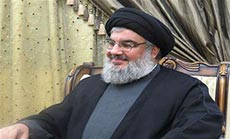
Local Editor
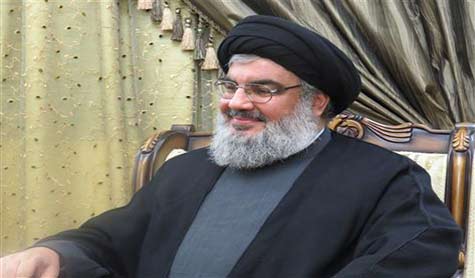
Interview of Hizbullah Secretary General His Eminence Sayyed Hassan Nasrallah with as-Safir newspaper
To read PART 1-2 click here.
To read PART 2-1 click here.
To read part 2-2 click here.
Part 1-1
To read PART 1-2 click here.
To read PART 2-1 click here.
To read part 2-2 click here.
Part 1-1
Hizbullah's participation in the battle in Syria
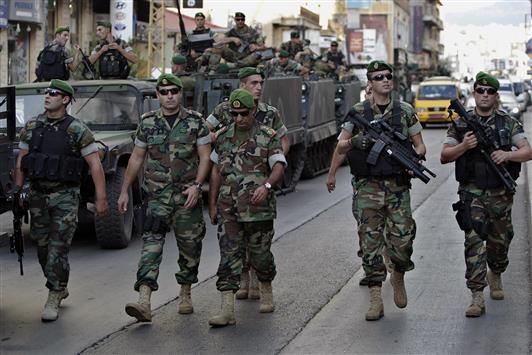
Q: In light of the developments that took place in Yabroud and the region of Qalamoun, and in light of the procedures taken in the Lebanese interior, did the risk of explosions drop or is it still valid in your evaluation?
A: We can say that the danger of explosions considerably dropped, whether it is due to the field developments in the region of Qalamoun that led to the closure of many booby-trapped cars factories which were discovered (whether in the city of Yabroud or the town of Ras Al-Ain by the Syrian troops), or due to the special security efforts practiced by the Lebanese Army and the official security apparatuses in disintegrating the nets which were importing, dispatching, and detonating booby-trapped cars.
In general, we can talk about a great retreat of this danger. However, we can't say that the risk is absolutely gone. More efforts are needs, whether at the borders with Syria or in the Lebanese interior.
Q: Some repeatedly say in the media, that the masses in Beirut Southern Suburb (Dahiyeh) are feeling suffocated by these security measures, and that the phenomenon of emigration from Dahiyeh to other region is increasing. Might this harm the relation between the resistance and it masses?
A: This portrayal is imprecise and exaggerated. Anyone can take a walk in Dahiyeh and see the traffic jam. There is nothing like that- emigration or immigration from Dahiyeh to other regions. Perhaps some families emigrated as there might be individual and very limited cases. This does not cause any problem. On the contrary, it is better that the population in Dahiyeh decreases, and that some families return to the South and Bekaa. It's because there is a kind of suffocation in Dahiyeh due to the high level of population.
However, to be precise, there is no emigration or immigration. There are very few cases, and this is very natural due to the current threats and explosions. This is on one hand. On the other hand, I mention the disposition. The disposition was also tackled in some media outlets. This is also untrue. I am not saying it is imprecise. Rather, it is untrue.
On the contrary, the explosions that took place in Dahiyeh, Bir Hassan, Hermel, or Lebweh, increased the degree of support for Hizbullah's military intervention in Syria. I am saying this based on surveys, information, and studies; I am not talking fancies. The truth is what I mentioned. Moreover, some hesitant people had changed their stances. In fact, whenever we would carry out surveys in regions, there would be people who support, oppose, or be hesitant. Some hesitant people had turned into supporters, and even some who used to oppose had turned into supporters, too.
Days ago in Ainatha, when I said that we entered late, I was expressing this disposition. Really, there is a disposition among people that says that we were late in our military intervention in Syria. We are not facing any such problem. The people are very much aware of the risks of this stage and of the nature of the current threats due to the events in Syria.
Here, I would like to add that this atmosphere is not in Dahiyeh, Bekaa, or the South; this is "the Shiite disposition." Through published and unpublished information and surveys and through communications with others, I came to know and I can assert to you that there is a vast popular disposition that supports Hizbullah's intervention in Syria. Many Lebanese - even from The March 14 Bloc - in the back of their minds and in their hearts approve and believe that the intervention in Syria protects Lebanon in face of these terrorist groups whose behaviors and practices we are witnessing daily. Thus, we do not feel estranged, and we do not feel that an opposing disposition is prevailing. Rather, we feel a great approval on this perspective. Moreover, what we are told under the table by political forces and religious authorities from various sects increases our confidence in this stance. Indeed, such things are said under the table because some sides cannot say their very words openly out of fear of the repercussions and negative impacts in the future, or that their relations with some regional states or some embassies in Lebanon would be influenced.
Thus, as far as this issue is concerned, we do not have any problem at all. On the moral level, the morals are very high. All what is said and promoted by some media outlets - especially March 14 Bloc media outlets - and personalities to the effect that Hizbullah is confused and worried, and that its popularity retreated is absolutely untrue.
Hizbullah has a very clear view. With days, this clarity over the events, the choices, and the future is increasing. Hizbollah is acting firmly and with determination. It is not hesitant or worried. Rather, it has confidence in the future. From the very beginning, we knew where things would go should we all cooperate together. Now, things are moving in this direction. So, there is nothing that causes being worried.
I assert to you that much of what is said in other places expresses the aspirations of the speakers. They do not express facts or events. Moreover, some pieces of news which are circulated in the media are exaggerated. For example, some of the well-known Arab media outlets are promoting stories that 500 Hizbullah members were killed in Qalamoun! Can 500 martyrs be hid in a society like the Lebanese society? Not one martyr can be hidden! What about 500 martyrs? One of the administrative problems is that when a martyr falls in Syria, his family knows before we come to know - meaning before that is reported via the normal organizational channels. Nothing of this sort can be hidden.
Days ago and for 24 hours, these media outlets promoted that the Syrian Armed Opposition captured 11 Hizbullah members, including an important personality. Where? How? Who? When the other side resorts to pumping such overt lies, then that is an indication that our moral status is very strong. Thus, they are trying to harm this moral status via lies because events cannot help in harming these morals.
The Phase of Toppling Syria is Over
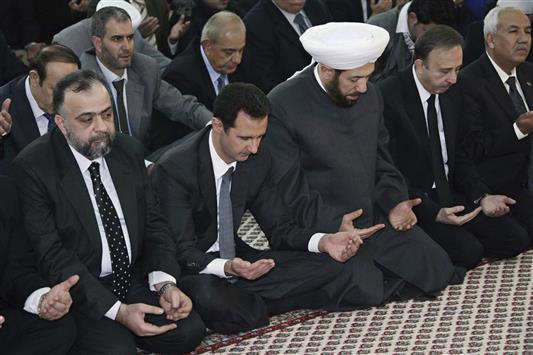

Q: Did the threat of toppling the regime in Syria come to an end or is it still valid?
A: My evaluation is that the stage of toppling the regime and the state is over because it had later been revealed that the issue is not that of the president as in other countries; it is of toppling the state, the Army, and the institutions as well as toppling the regime as a project from the military capacity to topple it.
Anyway, I believe that this is over now, taking into consideration all the given- whether field, military, or popular- as well as the position of the regime and the position of the opposition, in addition to the regional and international given. All in all, I believe that all of this is over. They cannot topple the regime. They can wage a war of attrition. As for major wars, there is nothing in the horizons that indicate that the opposition is able to wage a major war. What took place and is taking place in Lattakia and Kassab cannot be called a major war. The given of the field is assuring. It is a limited operation taking into consideration the number of fighters and the region they broke into, and the facilitations offered to them. However, it was met with great attention in the media.
So far, nothing appeared of the major war which was talked about to a great extent. They are closer to intimidations than to reality- I mean the war in South Syria. They were talking about massive troops being mobilized in Jordan, from which they would enter and invade and hold grip over Daraa and Sweidaa, and advance towards Damascus. This was what was being talked about weeks ago.
This is closer to intimidation. There is no data to this effect. At one stage even, they talked about 3000 fighters being trained, equipped, and prepared in Jordan.
Now, can these 3000 fighters take hold over Daraa, and Sweidaa and reach Damascus? In such a war, such a number is useless. Later on, they exaggerated the number a little and talked about 10 thousand fighters. Even 10 thousand fighters can't turn the table. Thus, there was talk about major battles- meaning the battle of southern Syria (the battle of Damascus)- which until now is closer to intimidation. As for the war of attrition, that might continue as long as there are states which are funding, arming, inciting, and pushing in this direction.
Q: If the regime is not militarily toppled so far, would it be able to carry on then?
A: It can carry on. The experience of the past three years proved that the regime is not weak, and that it enjoys a popular incubation. Had it been that the regime was weak, it would have collapsed and fell. If it did not enjoy popular incubation, it would have collapsed, too. I believe that in the past three years, the regime enjoyed a vast incubation apart from percentages. However, it is indisputable that the regime enjoyed a very wide popular incubation.
Q: Are the foreign elements still exerting pressure?
A: The regional and international situation changed. In my evaluation, the degree of pressure that will be exerted on the regime in the future stage will be less than that in the past three years, whether political pressure as well as the media pressure or the field pressure.
Starting with Saudi Arabia to Qatar, I do not mean that they changed their stance; however, the sharpness of the position, the magnitude of intervention, the given, and the linked expectations have changed extensively. From another perspective, the allies who did not give up Syria even when it was said that it would be toppled in two, three, five, or six months, will not give it up now that it has crossed the threshold of the threats of being toppled. The allies, whether they are states, regional sides, or local sides, are more convinced in supporting and backing Syria now than any time in the past.
All in all, I believe that things are moving in this direction. Indeed, the upcoming entitlements are no doubt great, whether it is the reconciliations, internal political dialogue, or internal address of the crisis. If things went smoothly, and they moved towards reconstruction- things won't be easy; however, plans are also being sought for that, and this issue is being addressed.
Q: Some masses have really refrained from the opposition. However, do they really support the regime now?
A: What we care for in Syria is the end of the war - this war which will destroy Syria or what is left of Syria. We care for the end of the war apart from who likes or dislikes that, or who is convinced by who. Should the war come to an end in Syria and it turns to an internal dialogue and internal addresses of the crisis, there would be a hope that many causes would be addressed. The real danger was and that is somehow still lurking is eliminating Syria and partitioning it. This danger was great and serious. I believe that we overcame the danger of partition. When we say that we overcame the threat of toppling the regime, we are also, more precisely, saying that we overcame the danger of dividing Syria. There was the issue of partition. This is dangerous. We can also say that we have overcome the threat of demolishing Syria and not keeping one block or another or, not keeping any possibility for the existence of a state that can reunite itself and address its crises. If we can reach a stage in which war would come to an end, fighting will stop. Bloodshed would stop. No more houses would be demolished. These things would be the pillars of the future. In fact, this had and is still preoccupying us.
The Opposition of the Syrian Regime...Falling Apart
Q: Specialists say that reconstructing Syria needs 250 billion dollars, and those who talk about 250 billion dollars talk about another Syria other than the one which exists now. To what extent, is this reconciliation or settlement is linked to the fate of the regime? Is the president still the guarantee or is his stepping aside is one of the conditions for building a new state according to some?
A: All the countries which were sponsoring the opposition in Syria were not ready to consider a political solution. Never! Qatar, Saudi Arabia, Turkey, and Egypt (in its previous position) never considered that. Now, I will go to the far countries, the Europeans, and the Americans. No one was ready to go for a political solution. Lately, the Arab League talked about a political solution. That came after a military flop. The world went to Geneva II due to their failure in the field. From the very beginning, they did not want a political solution. I still remember these debates. The story was not President Bashar Assad in person only. They were talking about the entire regime. It was required that the regime be toppled, then they would talk. What did it mean that, "it was required that the regime be toppled?" Where do they want to take Syria? In fact, what do the Turkish want Syria to become? Where do the Qataris and the Saudis want to take Syria, as far the great considerations, the considerations of the region, and the strategic considerations are concerned? Thus, you must move into the issue from this perspective.
We move into this issue from this fixed point: Syria's position, stance, and influence in the region and the great battle taking place in the region. They came to change this situation. They did not come to make democracy or justice, or to confront corruption. All of this war, this funding, these weapons, and this speech were to change Syria's stance and position and, indeed, to topple President Bashar Assad- being the head of this regime and the President of the Republic. Debates focused and targeted the entire regime. At one stage even and following one year, they saw that things were difficult militarily. Well, they were not desperate, but they found that things were difficult.
Q: What about the offers that were made to President Assad?
A: Yes, I know that serious offers were made to President Bashar Assad to the effect of changing this political trend, cutting diplomatic ties with Iran and the resistance movements in the region, and getting ready to undergo a true and comprehensive settlement with the "Israelis". Then, there would be no problem, and this issue would be addressed. President Assad refused, and he is praised for this stance of his. These offers were not made by international sides only; they were also made by sponsoring and apparently tough regional sides. In fact, the toughest side is the side which made this offer to President Bashar Assad. Yes, if you view the battle from this perspective, you can see it as something else. From this perspective, it was not easy for him to carry the required demands in the past years.
Q: Is the bloc opposing the regime still integrated?
A: The developments that took place lead you to conclude that the opposing front has weakened and is disintegrated now. I mean the front which was working for the project of toppling Syria. Let's take the following quick topics:
First: Let's start with the internal Egyptian issue first, which I have not tackled yet. When the great turn took place in Egypt i.e., when President Mohammad Mursi was ousted and, consequently, the Muslim Brotherhood were toppled from the regime in Egypt, there were several repercussions. Saudi Arabia backed the new situation in Egypt.
Turkey opposed as well as Qatar. So, first the bloc was cracked. In fact, this is the most important front: Saudi Arabia, Qatar, Turkey, and Egypt. Practically, the ties between Saudi Arabia and Qatar, Saudi Arabia and Turkey, Egypt (apart from Mursi) and Turkey, and Egypt and Qatar worsened. Problems mushroomed. This was the first change. Where was this change reflected? It had its repercussions in Syria despite the fact that they say that they were still cooperating over the Syrian issue. However, it is no doubt that things were not as they were at the beginning.
Second: Syria was on top of their priorities. Now and as a result of what took place in Egypt, they retreated towards the Egyptian interior, which became their primary concern.
Third: The dispute between Saudi Arabia and the Muslim Brotherhood had its repercussions on Syria. This is one of the results of the regional situation.
Fourth: The internal problems in Turkey.
Fifth: The changes that took place in Qatar.
Sixth: The events that took place in Iraq. Iraq was practicing the same policy Lebanon was adopting. It was the policy of staying apart from what is taking place. They remained as such until the situation in Iraq became very bad to the extent that the Syrian provinces neighboring Iraq became factories for booby-trapped cars. Every day, there were 10, 15, or 20 cars that were dispatched. All the investigations and arrests that took place led to reveal the sides that stand behind the booby-trapped cars networks. Thus, it led to the current confrontation between the Iraqi government and the so-called "Islamic State of Iraq and Levant" [ISIL]. The fighting between the Iraqis and "ISIL" has its repercussions, too, on the situation in Syria as well as on the stance of Iraq. Thus, we have noticed that the Iraqi political stance in the past years, whether in the meetings of the Arab Foreign ministers or in other conferences, are developing to a great extent.
This is above the table; however, what is under the table is totally different due to the steadfastness of the regime. Many of the Arab states are contacting the regime under the table and saying: "We are with you. Remain steadfast." I also know that some Arab states are apparently with the opposition; however, under the table, they are demanding the regime to act decisively and benefit from time. This is something very weird in the Arab situation.
Q: Your Eminence! What about the international situation?
A: As for the international situation, there is no doubt that the atmosphere is better now. Compare Geneva I to Geneva II. In Geneva I, there was no clarity. On the contrary, as for the Russians, was their stance strong enough to the extent that they stood next to President Bashar Assad, and consequently, said they would not abandon him or search for a bargain or a settlement? This was at least debatable. I did not want to judge the Russian stance at the beginning, in the sense that I did not have decisive information about it. However, lately there is no debate on that. I can rather say that in the past year, the Russian stance was steadfast and integrated, and has not shown any flexibility in the past months.
Q: Do you expect that the Russian stance would become even stronger after the events in Crimea?
A: Following the Crimean crisis, I believe that Russia's stance will become firmer. This is clear. Russia's protection of Syria will be greater because we have moved to a new stage which they may call a 'cold war' or whatever. Today, the Russians are adhering to all the points of strength, or the Russian fulcrums. The Russians will not give them up or bargain on them. The danger of a bargain, which was perhaps valid at one stage, has become very far. From this perspective, I believe that this will have its positive impact. However, from another perspective, if we are to talk about the negative impact, we have to suppose and continue the scene: Will the conflict or the enmity or the ardor in the political stance between Russia and America push the USA or the West to trespass the limits or the red lines or the controls which they have not trespassed so far because of the US-Russian ties?
Here, we can talk about a negative impact. Personally, I rule out that the Americans or the Europeans would take military steps not because of Russia, but because of the American situation, the US economy, the US administration, the US strategies in the region, and the European internal conditions.... All of these situations do not allow them to take such moves. Thus, I rule out what was said by some milieus to the effect that the Russian-US tension might widen the margin of the US or western movement towards Syria.
The crisis in Syria has a long-term, whether the events of Ukraine took place or not, because the roots of this issue are somewhere else. However, with the total sum of these points, you can say that what took place is more positive than negative, and to the interest of the state in Syria.
A: It is natural that he will run the elections. I believe that will take place.
Q: Is Hizbullah currently, contacting Syrian Opposition figures?
A: Such contact took place in the past, and there are figures in the Syrian Opposition which we are still contacting.
Source: As-Safir newspaper, translated by Al-Ahed News
Comments
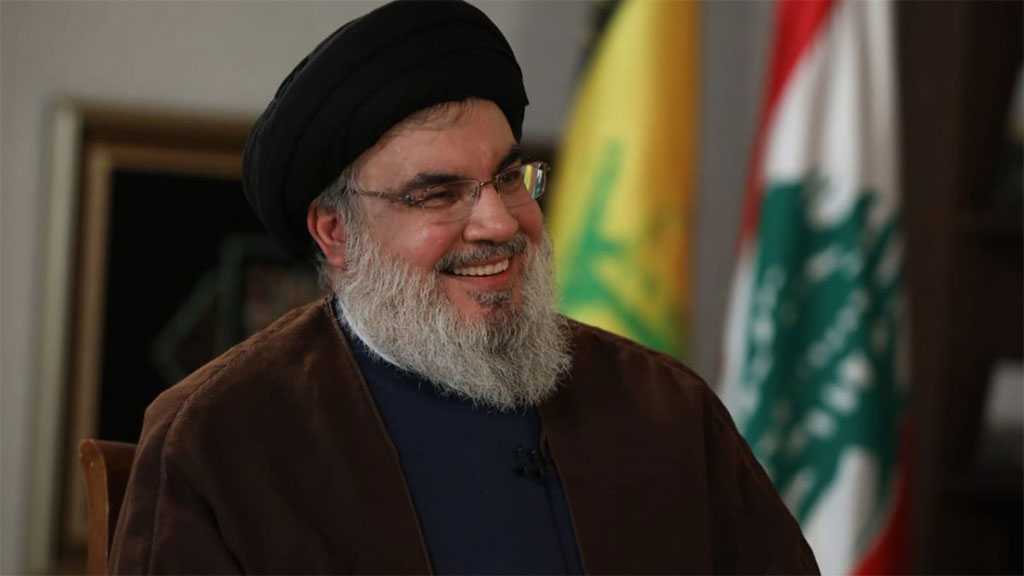
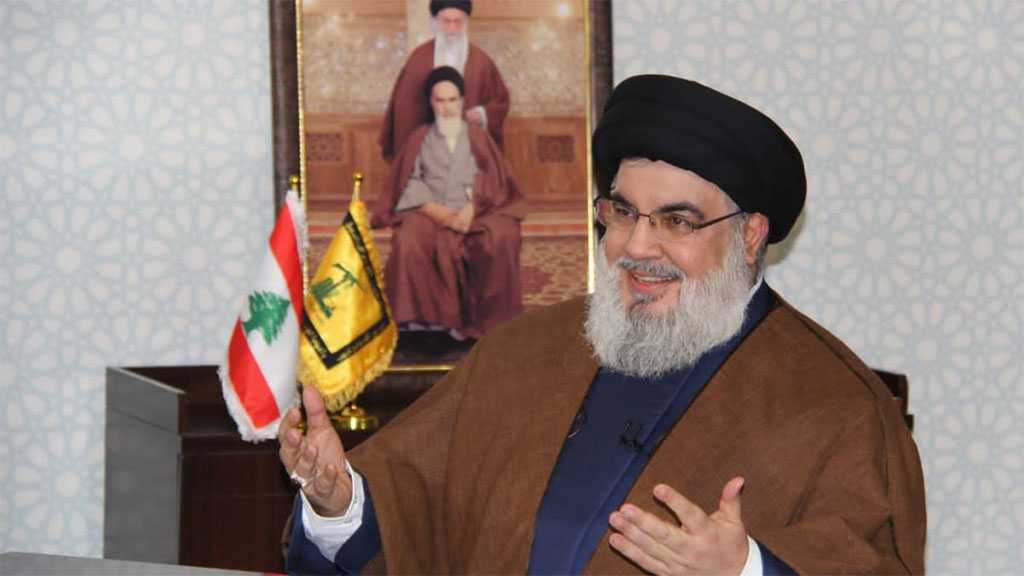
![Gen. Soleimani: Sayyed Nasrallah’s Entire Existence Is Sincerity… I Love Him [Documentary]](https://english.alahednews.com.lb/uploaded2/images/20220908122823.jpg)
